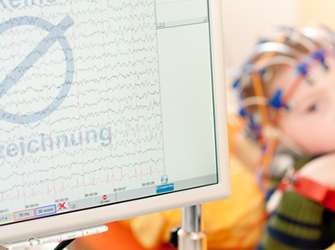Life without fits: New treatment for refractory epilepsies

Through a joint project between the University Departments of Neurology and Neurosurgery at the MedUni Vienna, a new treatment option has recently been launched that promises people with difficult-to-treat forms of epilepsy a significantly improved quality of life. Just how important this is has been demonstrated by a further recent study by the MedUni Vienna.
Around 70,000 people in Austria suffer from epilepsy, and there are an estimated 50 million sufferers worldwide. The problem, however, is that, despite the best possible medical treatment, a third of all people with epilepsy suffer fits, often with considerable psycho-social consequences as a result. There is now a new and highly promising treatment option available for these people that aims to alleviate their symptoms.
Patients with difficult to treat epilepsy will be offered a palliative option involving deep brain stimulation (DBS) as part of an interdisciplinary collaboration between the University Departments of Neurology and Neurosurgery at the MedUni Vienna. Ekatarina Pataraia from the University Department of Neurology at the MedUni Vienna explains how it works: "Electrodes are implanted in a part of the brain known as the thalamus. The permanent stimulation of these structures can interrupt the propagation of epileptiform activity and accordingly significantly reduce the frequency and severity of fits." The method is also already being used in the MedUni Vienna's university departments to treat other conditions (such as Parkinson's disease) very successfully.
People with epilepsy have less promising job prospects
Just how important it is to treat epilepsy is being demonstrated this year by a study being carried out at the MedUni Vienna's University Department of Neurology. Study principal Ekaterina Pataraia explains: "Only very few people with epilepsy go on to complete vocational training after compulsory education. As a result, these people have significantly poorer prospects on the jobs market." University or college courses are only very rarely completed too. Added to this is the continued problem of the stigma attached to epilepsy and the psycho-social stress that this can cause. For the healthcare system, this also means a considerable financial burden resulting directly from costs associated with managing the condition – such as drug costs and treatment by doctors, hospital stays and emergency admissions – on the one hand, and indirectly through other costs (such as inability to work, pension payments, care costs, etc.).




















